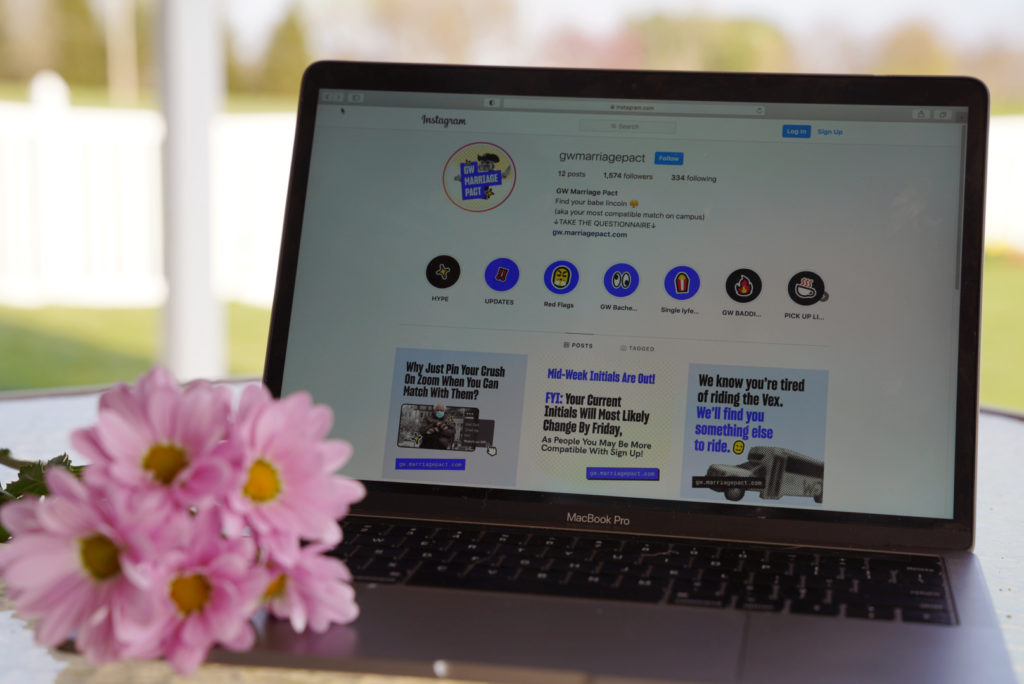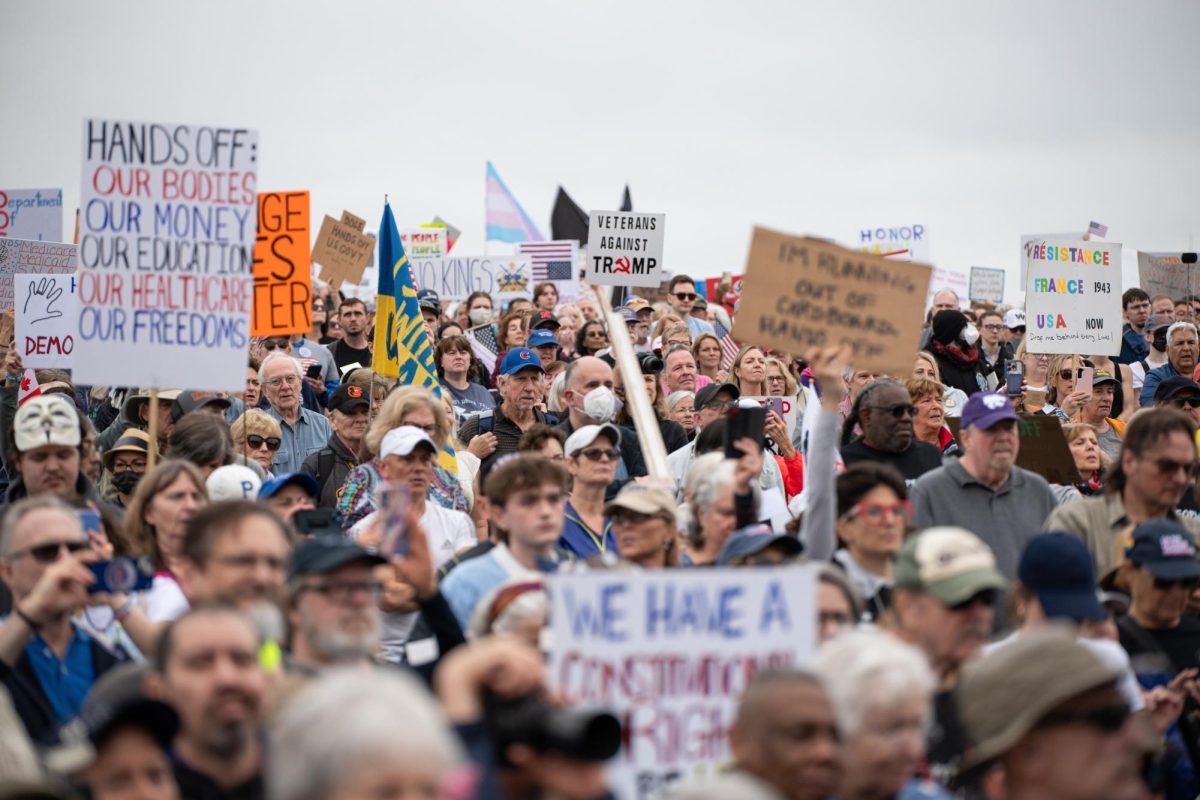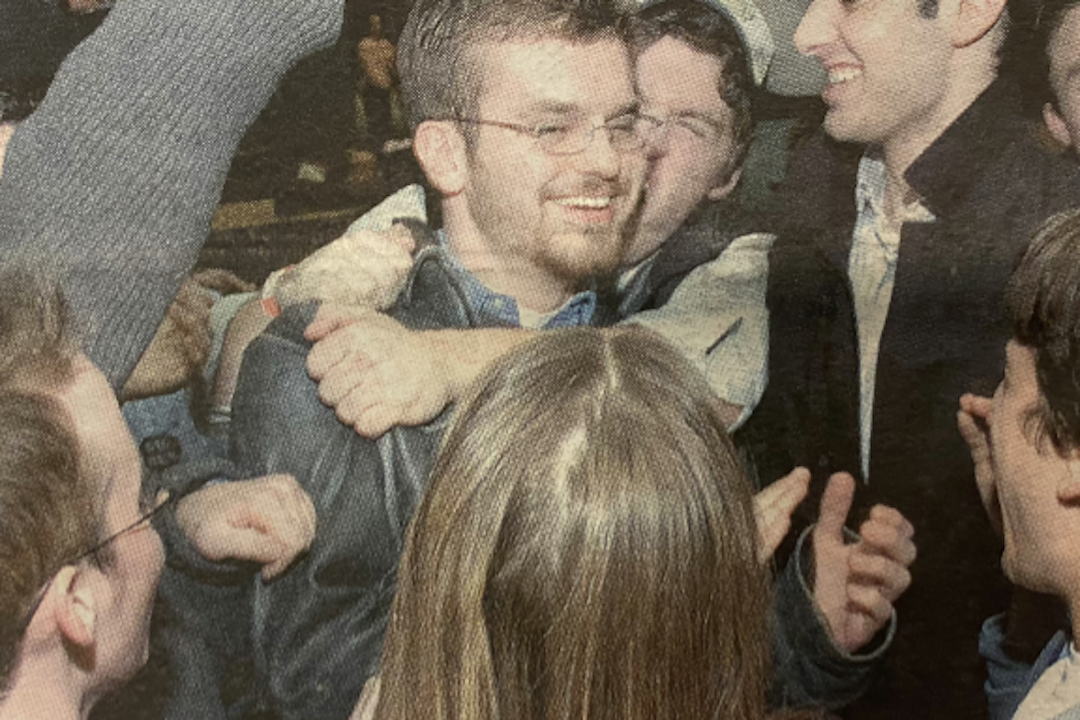Updated: April 8, 2021 at 12:20 p.m.
After scouring for virtual and socially distanced dates for more than a year, students have turned to a viral survey to find their perfect peer match.
As of Wednesday, more than 4,200 students filled GW’s version of The Marriage Pact, a questionnaire that uses respondents’ answers to 53 personality and dating-related questions to match students with their most compatible partner. The four students who run the program said viral TikToks matching college students through surveys inspired them to team up and launch a GW version.
“It’s just a level of community that GW never really had in terms of their dating culture,” said sophomore Emily Berman, one of the founders of The Marriage Pact. “It’s bringing that back more onto campus, even though we’re not actually on campus.”
The team promotes the questionnaire through interactive Instagram stories about college dating culture, messages in student organization group chats and general student outreach on social media, the founders said. The survey will close Thursday and respondents are expected to receive both the name and email address of their potential matches Friday via email, Berman said.
The questionnaire is open to all undergraduates and poses questions on topics ranging from the sense of humor a student prefers and to what degree they consider themselves an “adult.” The four founders of The Marriage Pact said the algorithm behind the questionnaire is confidential, but they added that the program is based on a Nobel Prize-winning matchmaking algorithm developed by a Stanford University professor.
The original survey was designed by two Stanford students for an assignment in their economics class in 2017 and has been adapted for universities across the country like University of Virginia and Yale University. The four students applied to the original Marriage Pact organization to run the project on GW’s campus.
The survey also features questions like “Would you rather have a high-paying job that you hate or a low-paying job that you love?” and “Would you rather be left at the altar or leave someone at the altar?” At the end of the questionnaire, respondents select the questions in the survey that meant the most to them, and the participants’ answers to those questions will be weighed more heavily in the algorithm, the founders said.
Berman, an international affairs major, said she hopes the project will build a stronger, more “tight-knit” undergraduate community, as opposed to what she calls the “disjointed” dating life at GW.
She said while the questionnaire is marketed for students to find a romantic interest, the actual algorithm is intended to find the most compatible match for each respondent – be it romantic or platonic.
After the four applied to run the GW-specific version of Marriage Pact and began preparing the survey, Berman said they all sifted through a large index of questions made by the original creator at Stanford and ranked the questions based on which would be most applicable to the GW community specifically. She said the group chose to include a greater number of political and career-related questions in GW’s edition because of students’ relatively high political engagement.
Neha Panigrahi, a co-founder of The Marriage Pact and a sophomore majoring in economics, said as someone who lacked “campus experience” as a transfer student, she saw the survey as a way to connect the student community during virtual learning.
“Even if the person you meet just becomes your friend, your best friend, your study buddy or something romantic, it’s just a cool way to meet someone you might never have met before,” Panigrahi said.
The four students said they hope to revamp the survey each year for a brief period of time as an annual tradition to bring the student body together.
Sophomore Kerrie Finegan, who also runs the project and majors in international affairs, said in addition to social media, she personally publicized the survey on the GW Reddit page.
“We’re really just trying to reach as many audiences as possible, talk in our group chats and DM random people on Instagram just to reach all the different types of social groups at GW,” Finegan said.
Hyatt Aronoff, a founder of The Marriage Pact and a sophomore majoring in public health, said GW’s version of The Marriage Pact goes “beyond” the “superficial” nature of dating apps, which typically rely on visual characteristics to connect people, by matching respondents based on their answers to “fun” and “interesting” questions.
“That’s another thing that you will never find on a dating app,” Aronoff said. “The questions aren’t really thought-provoking or challenging you or asking you the real stuff, so it cuts all the BS and gives you someone who has real, genuine, common interests instead of someone who you find really attractive.”
Aronoff said the survey hasn’t garnered enough straight and bisexual male participants to meet the demand for straight women participants, meaning some straight women will be left without a “love” match and may instead receive a “friendship” match. He said the algorithm runs all participants who are left matchless and finds each person their most compatible friend from the group that is left over.
To find more straight and bisexual men to take the questionnaire, he said the team came up with an idea in which respondents could submit a photo and short Tinder-esque bio of themselves to encourage men to sign up.
He said the team has received an “overwhelmingly positive” response through its Instagram account, which has racked up more than 1,500 followers since its creation last week. Aronoff said there has been a large amount of engagement among the GW community through interactive Instagram posts and stories that ask followers questions like “What is your biggest red flag?” and posts pictures submitted by followers of themselves or their friends as “GW’s Most Eligible Bachelors.”
“The amount of building that’s come through this anonymous base that we had going on every day with our stories and our Instagram posts and all this stuff has just been so fun,” Aronoff said. “In that way, we’ve already, at least I’ve already, accomplished a goal, because there is totally a community here in Marriage Pact.”








